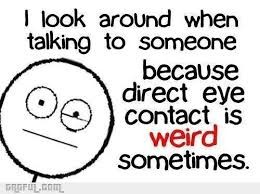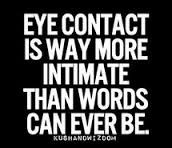Eye contact
 Eye contact means a lot in non-verbal communication. It is very difficult to have a conversation with someone who avoids looking at you. Though we listen with our ears, eye contact does matter. In human being, eye contact is a form of nonverbal communication and is thought to have a large influence on social behaviour. The term eye contact was coined in the early 1960s; and it has been in practice since then. The act is a significant and an important sign of confidence in social communication. The study of eye contact is sometimes known as Oculesics.
Eye contact means a lot in non-verbal communication. It is very difficult to have a conversation with someone who avoids looking at you. Though we listen with our ears, eye contact does matter. In human being, eye contact is a form of nonverbal communication and is thought to have a large influence on social behaviour. The term eye contact was coined in the early 1960s; and it has been in practice since then. The act is a significant and an important sign of confidence in social communication. The study of eye contact is sometimes known as Oculesics.
If you have good eye contact with a person, it generally projects your interest in the person while talk to him/her and it shows that you want to listen what the person is saying. If you look down or away from a person rather than meeting his or her gaze, it projects your disinterest in him or her. If you neglect making eye contact with a person, it signifies you lack self-confidence. People, who are self-assured and are convinced of what they are saying, have a clear eye contact.
 Eye contact and facial expressions are interlinked and they provide important sinals in conversation. I think, subconsciously we probe each other’s eyes and faces for approvals and disapprovals. Eye contacts stimulate strong emotions. It is an important element in showing fondness, flirting, love, romance, which serves to establish and determine interest in establishing relations. Mutual eye contact that signals attraction initially begins as a brief glance and progresses into a repeated volleying of eye contact. We all avoid eye contacts with strangers. Don’t we? If you frequently stare at somebody, it can impede the person’s privacy.
Eye contact and facial expressions are interlinked and they provide important sinals in conversation. I think, subconsciously we probe each other’s eyes and faces for approvals and disapprovals. Eye contacts stimulate strong emotions. It is an important element in showing fondness, flirting, love, romance, which serves to establish and determine interest in establishing relations. Mutual eye contact that signals attraction initially begins as a brief glance and progresses into a repeated volleying of eye contact. We all avoid eye contacts with strangers. Don’t we? If you frequently stare at somebody, it can impede the person’s privacy.
When people struggle to make eye contact with others, it shows that they are not confident. Failing to make eye contact suggests that the person is shy; it can also be taken as disrespect. Making eye contact for a longer than required indicates that a person is outgoing; but to some it might indicate aggression and over-confidence. So beware.
In interviews especially eye contacts are considered very important. The panelists do observe your eye contact. Switching your eyes from left to right and back all the time will make you appear insecure, careless, and confused. Do you know, that one study says that left side of face is more expressive than right side? Our critical thinking is controlled by left side of brain and right side of brain controls emotions. It is also found that females have better eye contact than male.
 How different cultures view eye contacts?
How different cultures view eye contacts?
The customs and significance of eye contact vary broadly between different cultures. Americans appreciate a good eye contact during conversation. In Spain, France and Germany also stable eye contact is appreciated. Maintaining constant eye contact is considered well mannered and polite. In Western cultures eyes are considered to show the central point of a person’s focus.
In Middle Eastern culture, eye contact is less common, and considered less appropriate than in Western cultures. There are strict gender rules; women should not make too much eye contact with men as it can be misunderstood as romantic interest.
In Asian countries such as China and Japan, eye contact is not considered an essential element in social interaction, instead it is often considered inappropriate. These countries have an authoritarian culture, in which subordinates shouldn’t make steady eye contact with their superiors. For example, students are discouraged from making eye contact with their professors, as it can be interpreted as a sign of disregard.
Many African and Latin American cultures are strong in hierarchical societies. In many circumstances intense eye contact is seen as aggressive, provoking and really disrespectful. Friends, eye contact is subtly ingrained in societies. It is worth to know what it means in each culture before taking a trip to a country.
And, do you know, that although it is common in Western culture for adults to admire babies and young children and commenting upon how cute they are; this is totally avoided in Vietnamese culture for fear that these comments may be overheard by bad spirits and those spirits will try to steal the baby or otherwise cause some harm to it.













































